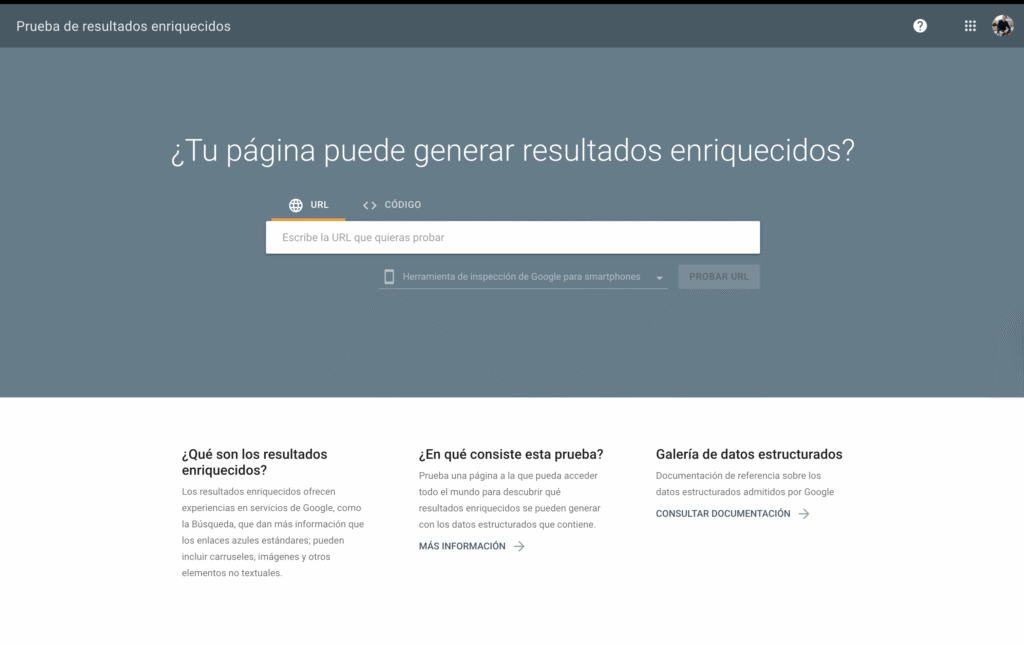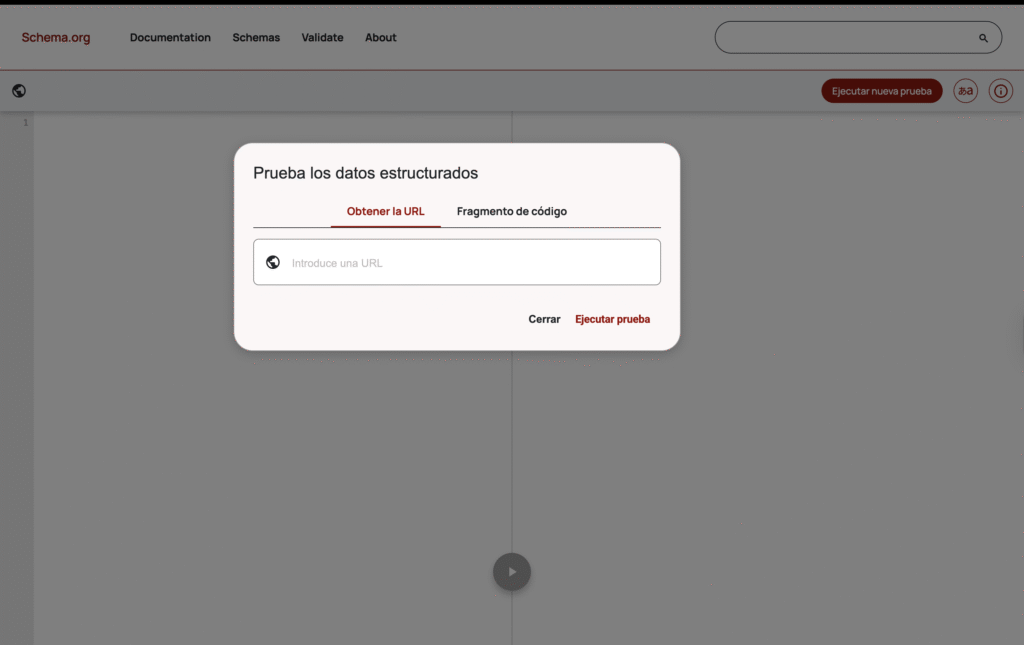Search is changing radically. I have addressed this issue in several articles on my blog.
- The rise of AI in search engines: from keywords to context
- Search Generative Experience: The New Era of Intelligent Search and its Impact on SEO
- Google and DMA: search changes revolutionizing tourism in Europe
- 2024 in AI: Avenues, challenges and what’s next in 2025
- Search GPT and Perplexity: New competition pressuring Google
With the advent of search engines powered by LLMs (Large Language Models), such as Google’s Search Generative Experience (SGE), Perplexity, or SearchGPT, the way information is interpreted and presented is no longer limited to blue links in a listing. Now, the engines generate contextual and synthesized responses. And this is where Schema takes on a new role.
When a search engine better understands the content of your page, it can display more relevant and useful results for users. These additional visual elements in search results are known as rich snippets.
In 2025, optimizing for search engines means not only thinking about “traditional” Google, but also about new AI-driven searches. In this context, the use of structured data becomes even more critical. The more structured your content is, the easier it will be for the search engine to include it in AI-generated responses.
10 types of structured data essential for hotel website SEO in 2025
Landing in the tourism sector, and especially in hospitality, structured data is key to stand out from the competition, especially in new generative search experiences.
Here are the 10 most relevant Schema types for hotels, with some examples in JSON-LD:
How do I know if I am using Schema on my website?
Before implementing new Schema types, it is a good idea to check if your website already has one active. To do this, you can use two free and official tools:
Google Rich Results Test – Within the Search Console, this free Google tool allows you to check if a specific page is eligible for rich results. It also displays the Schema types detected and any possible errors.
Schema.org Validator – This tool analyzes your Schema.org markup and verifies that the JSON-LD is well-structured, although it does not indicate whether it is valid for rich snippets.
Just copy the URL of a page from your site, paste it into any of these tools and see the analysis in seconds.
What is a JSON-LD file?
JSON-LD (JavaScript Object Notation for Linked Data) is the format most recommended by Google for implementing structured data on a web page. It is a block of code in JSON format that clearly and semantically describes the key elements of the page content.
This snippet is not visible to users in the browser, but search engines read it to understand the context of your site, such as whether it is a hotel, what services it offers, its location, and any reviews it has.
Where is it placed?
It is usually included in the HTML header (<head>) or just before the closing of <body>, inside a special tag:

Why is it important?
- It does not interfere with the page layout.
- It is easily understood by search engines.
- It’s flexible: you can bookmark everything from hotels to events, FAQs, products, articles and more.
Throughout this article you will see examples of how JSON-LD is used to represent different types of Schema relevant to hotels…
What if I have several types of structured data?
A common question is whether all structured data should go in a single JSON-LD block or whether it should be separated. The answer is: you can do both.
- Option 1: A single JSON-LD block with multiple objects: you can include several comma-separated objects within an array. This facilitates centralized management.

- Option 2: Several independent JSON-LD blocks: you can have multiple <script type=”application/ld+json”> tags distributed throughout the page, especially if you use different templates or components (e.g., one for the hotel, one for FAQs, one for an event).
10 types of structured data essential for website SEO in 2025
Landing in the tourism sector, and especially in hospitality, structured data is crucial for standing out from the competition, particularly in new generative search experiences.
Here are the 10 most relevant Schema types for hotels, with some examples in JSON-LD:
1- Hotel
The Hotel type is specific for hotel accommodations (within the LodgingBusiness category, which in turn inherits from LocalBusiness). Use this schema to mark the main information about your hotel, including its official name, physical address, contact phone number, website, photos, star category, amenities, and more. Essentially, everything that identifies your hotel as a business and physical location.
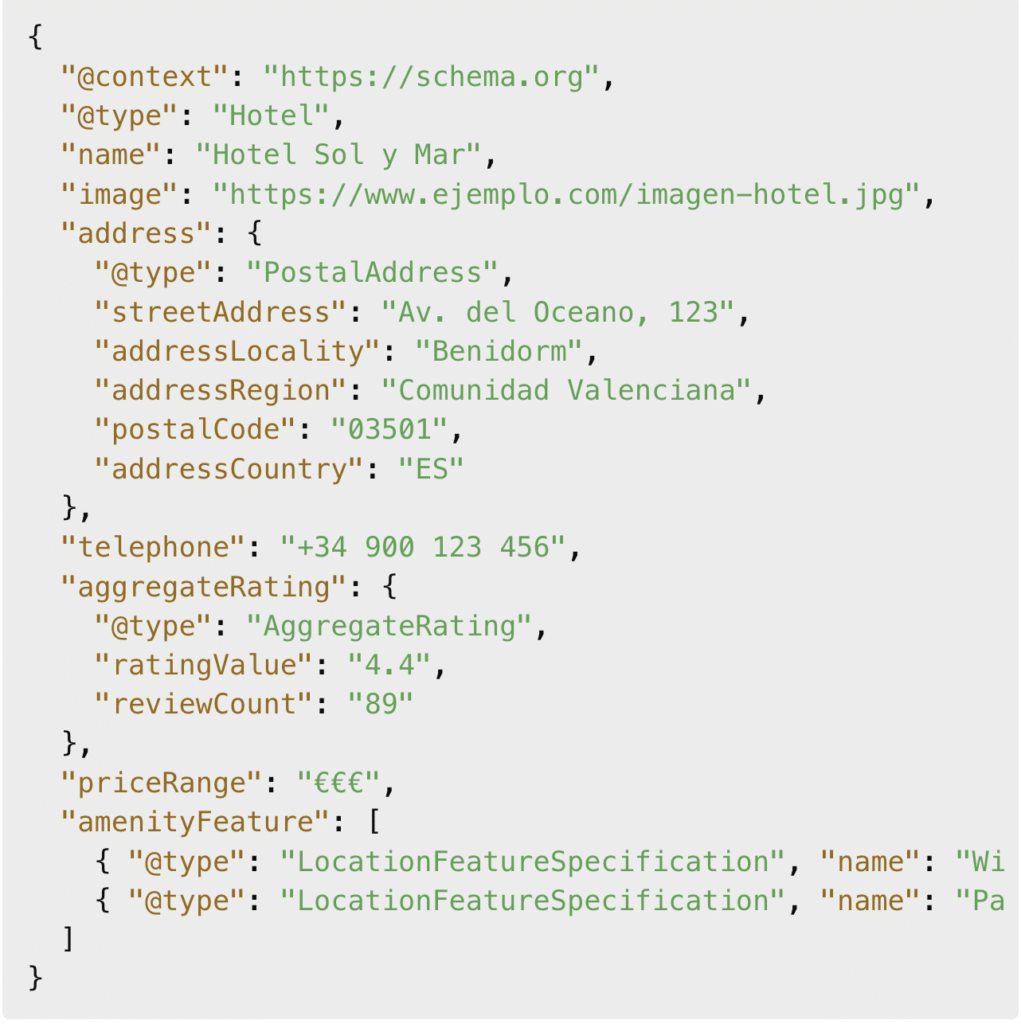
This is fine for a single hotel but let’s imagine we have a headquarters and we have 8 establishments. How would we handle this in the JSON-LD?
In that case, the best practice is to create an Organization branding for the central chain, and then a separate hotel branding for each establishment. Here’s how to structure it and what to consider:
1. Organization for the hotel chain (headquarters)
This Schema represents the parent brand or business group. It includes legal name, logo, corporate URL, social networks, etc.
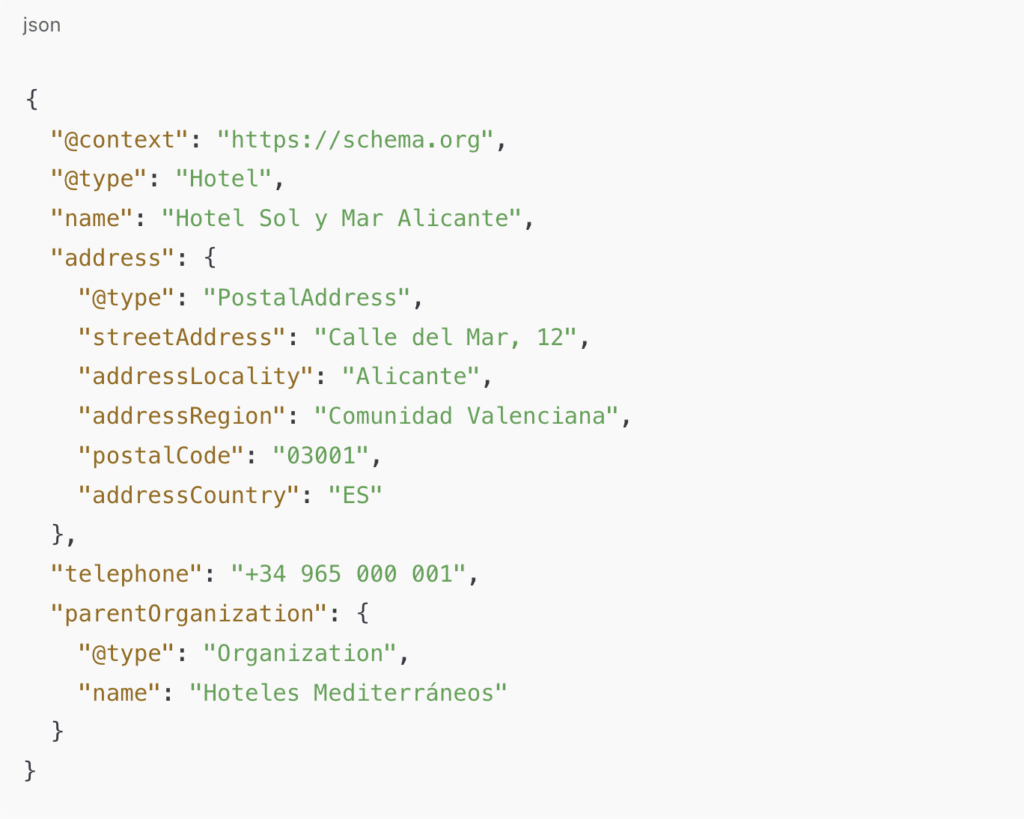
2. Hotel for each individual establishment
Each hotel is marked independently with its address, telephone, services, rating, etc. You can include a “parentOrganization” property to link it to the parent.
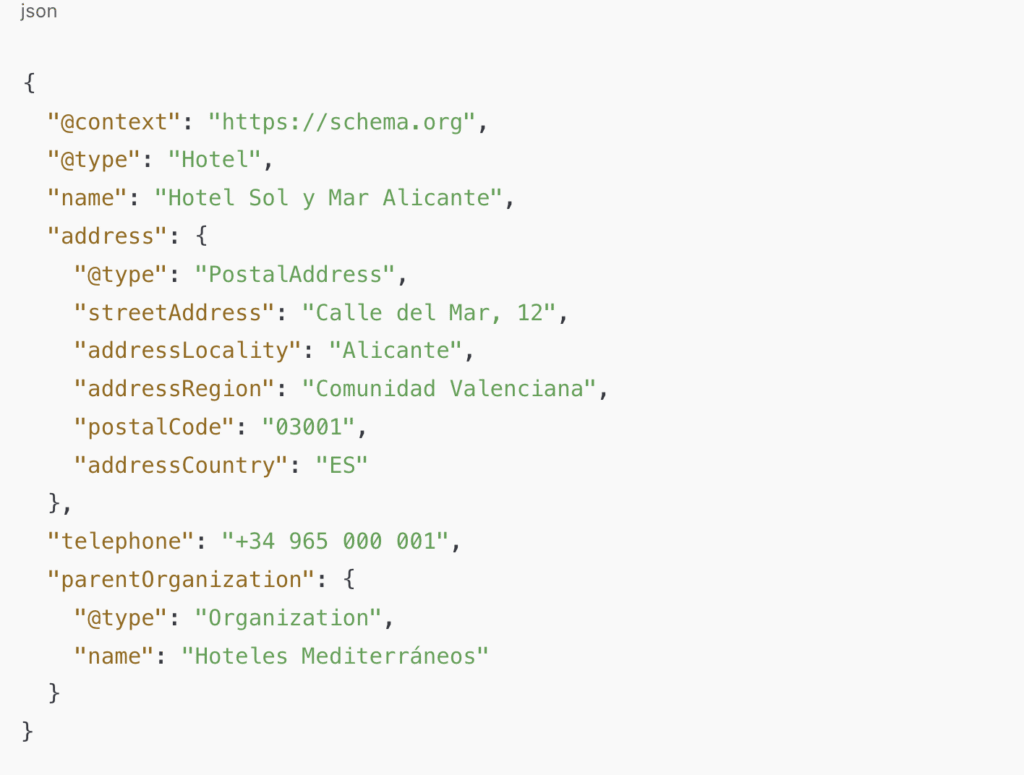
2. LocalBusiness
LocalBusiness is a more general schema that describes any local business with a physical presence (store, restaurant, etc.). In the hotel case, the Hotel is already a specific subtype of LocalBusiness, but we mention LocalBusiness separately because it encompasses some very important generic properties for local SEO. In fact, many recommendations suggest implementing LocalBusiness (or its variant, Organization) to ensure that the engines have all the corporate data. What does it include? Many of the properties overlap with Hotel properties: business name, address, phone, check-in/check-out times (these could be specified as opening hours), geographic coordinates (latitude/longitude, useful for Google to accurately locate it on the map), accepted payment methods, etc.
The idea is to clearly identify your hotel as a local business in a certain location, which helps it appear in localized results and on Google Maps.
3. Offer (Offer, promotion, price)
The Offer type is used to describe a specific commercial offer: a product or service made available for a certain price, under certain conditions. In a hotel context, an Offer is perfect to mark room offers, rates, and availability. For example, if you show on your hotel page that “Double room from 120€ per night”, this information can be structured in schema so that Google understands it as an accommodation offer.
In the case of hotels, Offer is usually linked to a room type (for example a HotelRoom or Accommodation object). You could have a markup indicating that your hotel (the LodgingBusiness) “makes an offer” for a specific room type. A simple way is to include within the room object an “offers” property with the price details
4. Review / AggregateRating (Reviews and Ratings)
Few elements convince an undecided traveler more than good reviews. In Schema.org we have the possibility to mark both individual reviews (Review) and aggregate ratings (AggregateRating). The latter is already evident in the Hotel example above: we use aggregateRating to display the average rating and number of reviews.
Additionally, you could mark each customer review on your page (if you publish testimonials or reviews) with a Review object that includes author, date, review text and an individual rating.
5. Event
Many hotels organize or host events, ranging from concerts in the bar and theme dinners to conferences and weddings, as well as local festivals. The Event schema is used to mark information about a specific event: name, date and time, location, ticket price (if applicable), description, etc. Even if your hotel simply promotes nearby local events (“what to do in town”), you could use this markup in your blog or events section.
6. FAQ (FAQPage) - Frequently Asked Questions
The Frequently Asked Questions (FAQ) section has become common in hotel pages to clarify common doubts about schedules, policies, services, etc. With Schema.org, we can mark up a list of questions and their answers using the FAQPage type, along with Question and Answer objects for each entry. The immediate benefit is that Google often displays FAQs directly in the search results, below your link, in a drop-down format. You’ve probably seen a result with 2-3 questions that you can expand without leaving Google: that’s thanks to the FAQPage markup.
7. ImageObject (Images and image data)
Images are fundamental in tourism and hospitality – a picture is worth a thousand words to inspire a traveler. With Schema, we can describe images using the ImageObject type. This allows us to attach metadata, such as the URL of the high-resolution image, its author, usage/licensing rights, caption, and so on, in a structured manner.
WebPage (Web page)
The WebPage type is used to describe characteristics of the page itself. It may sound redundant (“describe the web page within the web page?”) but it is useful: it is used to indicate the type of page (whether it is a home page, contact page, FAQ page, gallery page, etc.), its official title, description, and even elements such as content license or author (in case of articles). Why is it relevant for a hotel site?
Mainly because it helps to structure the site globally. Many SEO frameworks automatically add a WebPage JSON-LD to each page, indicating details such as “@type”: “FAQPage” on the FAQ page or “@type”: “ContactPage” on the contact page. This gives context to the search engine about the function of that URL. For example, if Google sees WebPage with name: “Gallery” and primaryImageOfPage with your featured image, it will understand that this URL is your hotel’s photo gallery, and might present it in results to someone searching for “[Hotel Sol y Mar] photos”.
9. Article / BlogPosting (Article or news content)
If your hotel website includes a content blog, news, or travel tips section (which is highly recommended for content SEO), then the Article schema or its variant BlogPosting is a must. This markup is used for text articles, such as blog posts, press releases, news, etc., and helps Google understand details such as article title, publication date, author, lead image, and more.
10. BreadcrumbList (Breadcrumbs or navigation breadcrumbs)
Last but not least, we have the BreadcrumbList schema, which represents the typical hierarchical navigation of a website (the “breadcrumbs” that usually appear at the top of a page, indicating the section > subsection > current page). Although they help the user to find their way around the site, we can also mark this structure so that Google understands it and, better yet, displays it in the search results instead of the URL.
Schema implementation in CMS such as WordPress, Drupal and others.
If you use WordPress:
- Use plugins like Rank Math or Yoast SEO to automatically mark up articles, FAQs or breadcrumbs.
- You can insert FAQ blocks directly in the editor and the FAQPage schema will be generated without programming.
- For custom schemes like Hotel or Offer, use plugins like Insert Headers and Footers to paste the JSON-LD code into the <head> of the page.
If you work with Drupal:
- Use modules such as Schema.org Metatag or JSON-LD schema.
- You can configure content types to automatically apply certain schema types such as BlogPosting or Event.
Other CMS like Joomla, Webflow or Wix also allow you to insert custom code or use specific extensions.
We’ve walked through the basics of Schema, its applications in the hospitality industry, and how to implement it without complications. In an environment dominated by artificial intelligence, structured data is the language understood by both traditional search engines and generative models.
Leaving your website without Schema today is like not translating your content into the language of your customers. Utilize these tags to increase your visibility in more places, gain a stronger presence, and boost your conversion rate.
From classical SEO to GEO (Generative Engine Optimization), the change is here. And Schema is your passport.
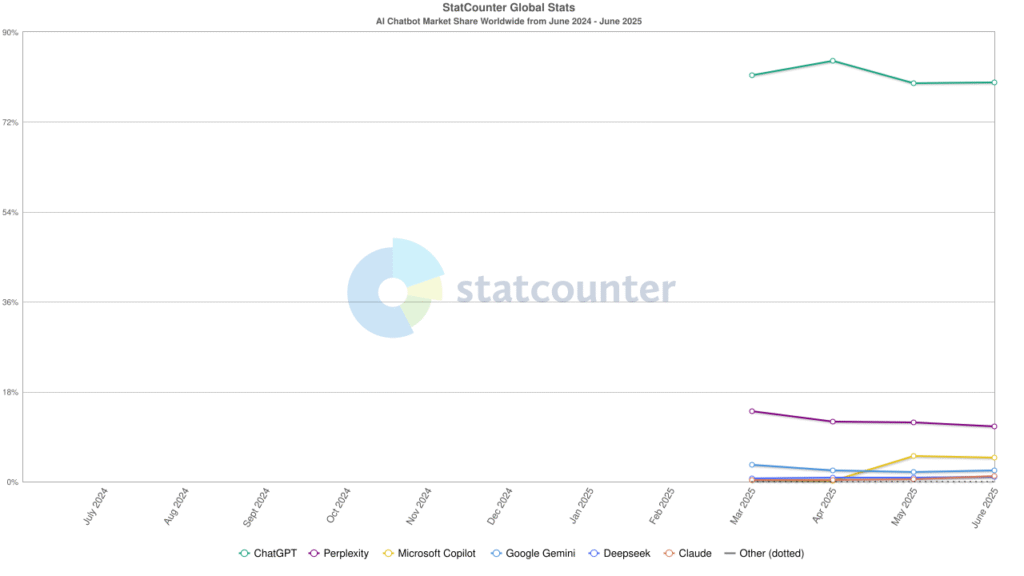
However, let’s look at the impact of Generative Search…
In absolute terms, Google processes approximately 14 billion searches per day in 2024-2025, but fully generative searches (those where the answer comes from generative AI rather than a classic link) represent a noticeably smaller fraction. For example, ChatGPT reports about 37.5 million daily interactions, yet only 30% are searches; that is, about 11 million searches, which is less than 1% of the total search volume versus Google.
However, the relevant implications are, on the one hand, the growth of searches and the deployment that Google itself will have to make of its generative search in order not to fall behind the rest of the engines, and on the other hand, the massive use made by younger generations. Among Generation Z, generative search has an exceptionally high share: up to 31% of their searches are performed on AI platforms such as ChatGPT.
I hope you found this content useful
Have a good week!


